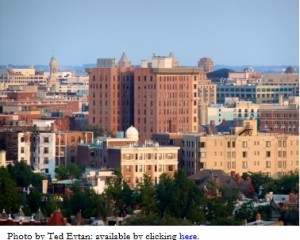The DC Council will vote today on legislation that could use disposition of DC-owned land to create new affordable housing throughout the District’provided the Council doesn’t approve two potential amendments that would significantly weaken the bill. These amendments could remove transparency and accountability from the land disposition process and make it easier for developers to reduce the length of time new housing must remain affordable.
The Disposition of District Land for Affordable Housing Act of 2013 would allow DC’s public land to be sold below market value and in return would require developers to make a portion of the new housing built there affordable. This smart approach pairs private and public resources toward the creation of badly needed low-cost housing, creates mixed-income communities, and helps low-income residents live in rapidly developing areas with greater chances of economic opportunity.
The bill would use public land value to generate mixed-income communities with a substantial amount of affordable housing. It would require 30 percent of new housing built near public transportation to be affordable. Elsewhere, 20 percent of the units would need to be affordable.

For rental properties, a quarter of the affordable units would be for people with incomes under $29,000 for a family of three (30 percent of AMI), and the rest would be for residents making up to $48,300 for a family of three (50 percent of AMI) For homeowner properties, the affordable units would be split between residents earning under $48,300 and those earning under $78,200 for a family of three (80 percent of AMI)..
Yet, two potential amendments could significantly weaken the bill by:
Removing the Chief Financial Officer’s independent evaluation. One amendment would
allow the mayor to waive the affordable housing requirements for any given project, without any documentation to justify it. In contrast, the current bill entrusts DC’s CFO to provide an independent, expert assessment of whether a development can meet the affordability requirements. Without it, public land dispositions would lack transparency and there would be no way to ensure that affordable housing is maximized. The CFO has testified that they can administer the review process.
Allowing affordable housing units to disappear over time. Another amendment would allow the time period for affordability requirements to be shortened by the mayor. In DC and across the country, communities struggle to replace affordable housing when requirements end after 10 or 20 years, before the end of a building’s useful life. The bill recognizes that the District’s land is a public asset, and it should be leveraged to require housing built through land dispositions to remain affordable for the life of the building.
The District’s publicly owned land presents a unique opportunity to use the rapid growth in property values to create a greater number of affordable units. By offering land at a discount, the District can create affordable housing units without using a tax dollars. In return, low-income residents get to live in mixed-income areas that have greater economic opportunities such as access to job centers, higher-quality schools, and greater public amenities.
That is why the DC Council should vote yes on this bill and no to the proposed amendments that would significantly weaken its ability to create desperately-needed low-cost units across DC.
To print a copy of today’s blog, click here.
